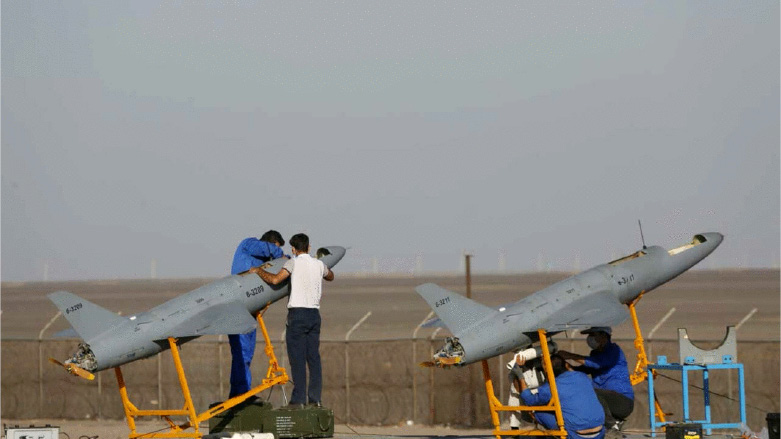US sanctions Iranian companies for drone sales to Russia to use in Ukraine war
The action marks a shift in the Biden administration’s policy in the region away from a narrow focus on the renewal of the 2015 Iranian nuclear deal

WASHINGTON DC, United States (Kurdistan 24) – The Treasury and State Departments announced on Thursday that the US was imposing sanctions on Iranian entities involved in the production of UAVs—unmanned aerial vehicles, or drones—that Tehran is exporting to Moscow for Russia’ use in its unprovoked attack on Ukraine.
The action marks a shift in the Biden administration’s policy in the region away from a narrow focus on the renewal of the 2015 Iranian nuclear deal, which Donald Trump left in 2018. That policy led the administration to avoid taking positions that might create tensions with Iran—including in regard to Iraq’s internal political struggles, as well as issues in dispute between Erbil and Baghdad.
However, that posture, which was harmful to the Kurdistan Region, seems now to be shifting, after President Joe Biden’s Aug. 31 phone conversation with Iraqi Prime Minister Mustafa al-Kadhimi, followed by the visit of Barbara Leaf, Assistant Secretary of State for Near Eastern Affairs to Baghdad and Erbil, from Sept. 4 to 9, as well as the visit of CENTCOM Commander, Lt. Gen. Michael Kurilla, who met with Prime Minister Masrour Barzani in Erbil on Sept. 8.
Iran’s Drone Transfers to Russia-Primacy of Ukraine in US Policy
Secretary of State Antony Blinken announced the new sanctions in a statement published late on Thursday, titled, “Designating Iranian Proliferators of Shipping Unmanned Aerial Vehicle Technology to Russia for Use in Ukraine,”
That very title highlights a key factor leading the administration to cease its studied effort to avoid confrontation with Iran, as there is no issue now that is more important to the US than Russia’s aggression against Ukraine.
US policymakers see history’s shadow in current events. As Biden affirmed in early June, “Nothing like this has happened since World War II.” Without being explicit, Biden was likening Vladimir Putin to Adolph Hitler.
And the Biden administration seems to be starting to recognize that Iran is allied with Moscow, even as Moscow has become a mortal enemy.
Indeed, as a State Department Spokesperson told Kurdistan 24 last week, “Russia deepening an alliance with Iran is something that the whole world should look at and see as a profound threat.”
Details of New Sanctions
Brian Nelson, Under Secretary of the Treasury for Terrorism and Financial Intelligence, explained the new sanctions, saying, “Russia is making increasingly desperate choices to continue its unprovoked war against Ukraine, particularly in the face of our unprecedented sanctions and export controls.”
The new sanctions target the production and distribution of the Shahed-171 UAV. That program is “owned” by the Islamic Revolutionary Guard Corps (IRGC)’s Aerospace Force (IRGC ASF.), according to the Treasury Department, which also suggested that the Iranian drone was manufactured by reverse-engineering Israeli and US drones.
The sanctions involve one individual and four companies. That individual is Rehmatollah Heidari, a 36 year old Iranian. He is the managing director of Baharestan Kish, an Iranian company, based on Kish Island, which manufactures components for the drone.
In addition, three other companies were designated. One is Safiran Airport Services, which is based in Tehran. It has “coordinated Russian military flights between Iran and Russia,” including flights that carried the drones and related personnel and equipment.
Parvar Pars is another company that has been newly sanctioned. It is “closely associated” with Imam Hossein University in Tehran, the Treasury Department said. The university, according to Treasury, Is “controlled” by the IRGC.
Parvar Pars “was involved in the research, development, and production” of the Shahed-171, which was developed by the IRGC ASF, Treasury said.
“In the past, the IRGC ASF distributed U.S. and Israeli made UAVs to Paravar Pars Company, which were ultimately used to reverse engineer and reproduce indigenously made UAV models,” it explained.
The third company to be sanctioned carries the unwieldy name, Design, and Manufacturing of Aircraft Engines. It was “involved in the research, development, and production” of the Shahed-17.
The company is, according to the Treasury Department, “a front company” that conducts “covert procurement activities for Iran’s Aircraft Manufacturing Industries, an entity affiliated with Iran’s Ministry of Defense and Armed Forces Logistics.”